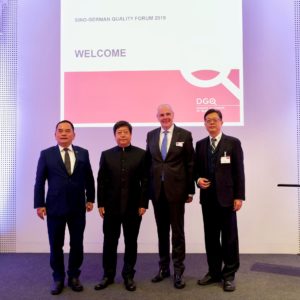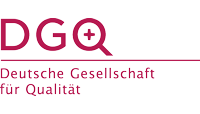7. January 2020
Sino-German Quality Forum highlights differences in quality culture of German and Chinese companies
Understanding the quality cultures is key to improving cooperation between German and Chinese companies.
This was the tenor of the Sino-German Quality Forum on the 27th November 2019 in Frankfurt. The German Society for Quality (DGQ) and the Shanghai Association for Quality (SAQ) are holding this form of cooperation event annually either in China or in Germany. The Sino-German Quality Forum brings together high-ranking business representatives and representatives of the quality infrastructure of both countries.

Huang Qinfen, Vizepräsident der Shanghai Association for Quality (SAQ), Huang Guoliang, General Director Quality Development Bureau of State Administration for Market Regulation of People’s Republic of China, Udo Hansen, President of DGQ, You Jianxin, Vicepresident of SAQ and Professor der Tongji University (from left to right)
About 120 quality interested people participated in this year’s event, which took place in Germany for the second time. The motto this year was: “Quality culture in Germany and China – differences, challenges and opportunities for organizations and for the society”. DGQ President Udo Hansen emphasized the great importance of the quality culture right at the beginning in his welcoming speech and traced the differences in the development of both countries as in the following:
“The quality culture has a great influence on the quality of products, services, management systems and processes. It also has a strong influence on the way interfaces are handled within organizations and also between different organizations. The consideration of the different quality cultures in Germany and China is indispensable for all industries concerned, but also opens up great opportunities for optimising cooperation. In addition, this topic can also be used to display very important differences between China and Germany. The fact that a new ISO project on the subject of “Quality Culture” has just been launched on the initiative of the Chinese Standards Institute shows how topical the subject is”.
The rest of the morning program was then reserved for the Chinese speakers. Huang Qinfen, Vice President of the Shanghai Association for Quality (SAQ), pointed out the importance of this forum as a platform for mutual exchange of knowledge and experience. He used a few examples, including joint projects with the Port of Hamburg, to illustrate the success of German-Chinese cooperation.
Huang Guoliang, General Director Quality Development Bureau of State Administration for Market Regulation of People’s Republic of China, also pointed out the benefits of cooperation between the two countries. Aspects such as digitalisation, environmental protection, sustainability and changing customer expectations placed new demands on quality. Keeping this in mind, the complementary quality cultures of Germany and China offer new opportunities for both sides. You Jianxin, Vice President of the SAQ and Professor at Tongji University, focused on digitalisation. He made it clear that Chinese legislation must keep pace with the rapid development of digitalisation. The other Chinese lectures dealt with the importance of quality for small and medium-sized enterprises and presented the construction project of the Shanghai Tower as well as a water supply company. The topic of “quality” also played an important role here.
After the lunch break, Prof. Dr. Eike Böhm, Chief Technology Officer of Kion Group AG and member of the DGQ board, reported on how a Chinese-American product launch can work out in a German company. The topic was a product line of forklift trucks for the US market, which was to be developed in China. The challenge was to combine different quality perceptions and cultures of the project participants from China, Germany, the USA and France in order to achieve a high project quality.
Christoph Winterhalter, Chairman of the Board of the German Institute for Standardisation, then explained why a digital quality infrastructure needs SMART standards. At the beginning of his presentation he emphasized that the German standardization strategy always prioritizes international standards over national standards. There were more and more standards with a digital reference, and accordingly, experts from various disciplines had to meet much more frequently to develop a standard. His diagnosis: Today’s quality infrastructure is highly analogue, but we need a digital quality infrastructure – and we need it at an international level.
Russel Longmuir, Chief Executive Officer of the European Foundation for Quality Management (EFQM), reported on the new EFQM Model 2020, which the EFQM presented in November 2019. He explained the development process and the modified orientation. Thus, current megatrends were also taken into account in the development of the model. Longmuir also emphasized the great importance of the respective organizational culture.
At the end of the lecture program, Prof. Dr. Dr. h.c. Dietmar Vahs, Managing Partner, Institute Director and quality awareness expert, presented the results of a study on quality awareness in German companies. He named the most important points that stand in the way of a strong quality culture.
After a day full of exciting, varied and insightful presentations, the DGQ president drew a positive conclusion for the second Sino-German Quality Forum in Germany. The topic of the event had been treated from different perspectives. As President of the DGQ, he was particularly pleased that quality had repeatedly been a central theme throughout the various presentations.


